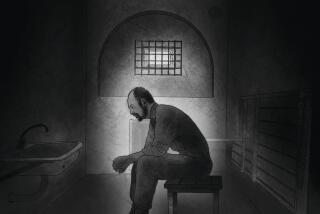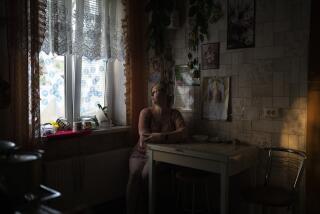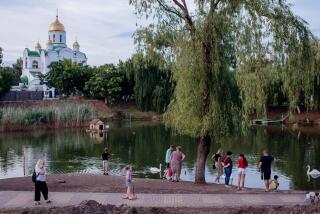In Russian Arctic, Government Subsidies Dry Up and Residents Want Out
- Share via
VORKUTA, Russia — Raisa Kalinechova worked 25 years at a power plant in the Russian Arctic, helping to realize a decades-old national dream of conquering the region and its riches.
Now a pensioner living in a neighborhood of derelict houses, all she wants is a ticket out. “I’ve been on a waiting list to move south for 10 years,” Kalinechova complained. “I just want to die someplace where I won’t be covered in frost.”
Many of the 190,000 people in this coal-mining city are likewise agitating to go south as part of a government program to move out northern residents who are no longer working. They’ve become a burden on local budgets gutted by the withdrawal of state subsidies.
But just as the government can no longer afford to colonize the North at any cost, it cannot spare the resources to resettle people. The Vorkuta city government managed to find new homes elsewhere for just about 700 people last year--of approximately 75,000 who would like to go or whom the city would like to strike from its pension and welfare rolls. Others have had to find their own way out.
“At this rate, we’ll be moving people out for the next 100 years,” growled Mayor Igor Shpektor, who’d rather spend his budget on new housing to replace the cracked, heat-leaking prefab houses that dot the city, which is 1,200 miles northeast of Moscow.
In the depths of winter, above the Arctic Circle, the sun barely peeks above the horizon before disappearing again. Temperatures regularly plunge to 40 to 60 below zero. In Vorkuta, the snow melts in June; it’s back by August.
The North--which is defined using a complicated formula known as the “discomfort index”--covers the Arctic and more than half of Russia’s territory. Just 8% of the population lives there, but it produces a fifth of the country’s gross national product and up to 60% of its raw materials exports, according to government data cited in the newspaper Izvestia.
Yet the North is also a big drain. It costs twice as much to sustain a minimum standard of living there as in Russia’s central belt.
Because of the harsh weather and the high cost of food and other consumer goods brought in from central Russia, workers across the North receive up to 2.8 times more in pay than their counterparts elsewhere in the country, and state companies once got generous subsidies. That was one reason why Vorkuta and other northern cities swelled.
“The quantity of coal here could support a city of 80,000-120,000 people. But Socialist gigantism and the Soviet system of planning--the more you plan, the more money you get--led to a city of 250,000,” said Vitaly Troshin, Vorkuta’s chief architect.
The city and many of its mines were built by prisoners. More than 2 million people, many of them political prisoners, passed through Vorkuta’s camps between 1934 and 1954, the year after Soviet dictator Josef Stalin’s death.
“There’s no other place in the Soviet Union, in the world, where so many camps were concentrated,” said Troshin, who is also co-president of the local chapter of the memorial society dedicated to honoring the victims of Stalinist persecution.
After the Stalinist era, prison labor was replaced by volunteer settlers seeking adventure and a higher standard of living than elsewhere in the Soviet Union. The city and its coal company used to sponsor sports clubs and summer vacations and paid for the import of fresh fruits and vegetables as well as vitamins for children.
Now, however, the company has hit hard times. Government subsidies have fallen from 70% of the cost of digging out coal to about 11%. Six of Vorkuta’s 13 mines, judged unprofitable, have been shut down over the last few years. Miners working the remaining shafts are owed about 11 months’ back salary.
The perks are gone, along with the state’s pride in conquering the North.
“It used to be that everybody here felt he was needed,” mourned Alexander Sharayev, a miner specializing in building tunnels. “He got enough so he never had money problems. And there was a system of symbolic incentives, medals and ceremonies that said ‘Thank you.’ Now no one needs us.”
Sharayev arrived in Vorkuta 20 years ago from the Tver region of western Russia, attracted by high pay and the close-knit community feeling of people carving out a life in tough circumstances.
At the time, he painted reindeer on the walls of the crowded preschool across from his apartment, in hopes his daughter Anya would be admitted. In more recent years, he’s played Ded Moroz, the Russian equivalent of Santa Claus, at an elementary school.
Today the preschool building is abandoned, and the elementary school has just 21 students; two years ago, 70 were studying there.
Sharayev is humiliated by the salary arrears, which have forced him to pawn his wide gold wedding band four times, and he becomes depressed when he looks at the crumbling, abandoned houses in his neighborhood.
“You have the constant feeling that you’re here just temporarily,” Sharayev said.
Twenty percent of the city’s residents are pensioners, many of them entitled to free transportation, cut-price housing and other perks due the pioneers who opened up Russia’s vast north.
Their large number is a particular burden on the city budget, which brings in just one-third of the revenues it needs to support its housing and social programs. The mine closures have robbed the city of taxes and, together with the shutdown of the local poultry and sewing plants a few years ago, have thrown 5,000 unemployed onto the city’s welfare register.
The most burning question for many Vorkuta residents is how to get out--”back to Russia,” as they put it. Many came in hopes of working 10 or 15 years and then moving south to live on their savings. But Russia’s economic crises have crushed their nest eggs.
Even those who managed to buy retirement homes elsewhere years ago feel they can’t afford to move to places where they won’t get big northern pensions--just the 300-400 rubles ($15-$20) that most Russian retirees get each month.
The dilemma is especially tough if those retirement houses are in former Soviet republics like Ukraine, now independent countries where Russian pensions aren’t paid at all.
More to Read
Sign up for Essential California
The most important California stories and recommendations in your inbox every morning.
You may occasionally receive promotional content from the Los Angeles Times.










